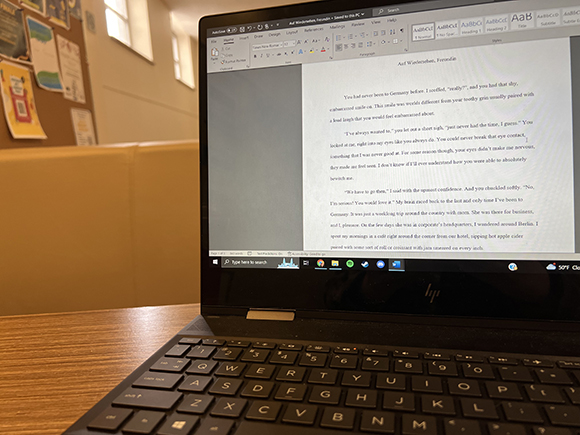While the creative-writing student population is low, the courses are profound and diverse.

We all know by now how many opportunities we have at the Mount. From nursing to accounting, there is a space and a program for all walks of life here on campus. But what are some of the lesser-known areas of study?
Within the Liberal Arts Department, students can take several creative writing courses, and even register with a creative writing minor. However, this is one of the smaller minors when it comes to the number of people registering. Most English or creative writing electives have only about ten people in each, on average.
These class sizes can result in a strong bond, both between the classmates and the professor. However, sophomore Liberal Arts major Jack Yakimow is enrolled in two of these electives currently and feels that "class discussions are greatly limited” due to only a handful of people in the room. Because of the small number of students signing up for these classes, only one section is offered. This can often make it difficult for students to enroll if they need to meet graduation or major requirements first.
Not many students find themselves being drawn to these classes though; how could a Biology major fit into a poetry class? What good does that do them?
Liberal Arts professor Dr. Elizabeth Mason believes that “practicing writing is valuable in of itself.” No matter if students are writing a short story or a research paper, “the skill is the same.” When you pay more attention to your word choice, sentence structure, and tone, your writing will get better overall, no matter the format. Creative writing teaches you how to portray a voice through writing, and the honing of the voice only comes with practice through poetry, short stories, scriptwriting, etc.
One of the more popular Creative Writing classes is Dr. Drew Shannon’s diary class (The Story of Your Life: Writing Diaries, Memoirs & Autobiographies). Even though this is not what most think of as “creative writing,” diary-keeping and autobiographical work is certainly a creative and personal form. Shannon believes that students can learn “how to take charge of your life because you’re writing your version of events. You own what happens to you.” The laid-back style of writing a diary can also provide "a lot of therapeutic benefits," which is something almost any stressed college student could gain from.
Dr. Rex Easley, an adjunct Liberal Arts professor, equates all writing to "construction jobs." Whether fiction or essay, all writing follows a format that depends on language skills. If you can perfect this skill, your future self will thank you. Biologists report their findings. Managers write business proposals. Healthcare workers record the symptoms of their patients. Writing is an essential skill in nearly every single career, and creative writing can only help further your emotional and professional self.
Interested in taking a Creative Writing class sometime? Talk to your advisor or search “Liberal Arts” under the Register tab on myMount.
